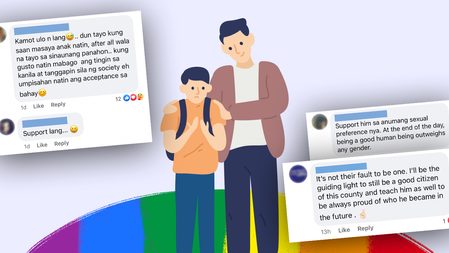SUMMARY
This is AI generated summarization, which may have errors. For context, always refer to the full article.
![[Science Solitaire] My father’s rice cake called ‘usisa’](https://www.rappler.com/tachyon/2021/06/fathers-usisa-rice-cake.jpg)
Usisa – that is what he said I characteristically loved. I was barely three then, and I was eating my favorite rice cake variation when my Dad said that funny word to me, so I agreed with him. So for weeks after that, I really thought that usisa was the special name for that rice cake.
U-S-I-S-A. This Tagalog word, which meant inquiry, curiosity, would hiss in my tiny mouth with relentless air, marching through the loosely layered grains of caramelized rice balled up to punctuate my early childhood afternoon meals. I was so convinced it was called usisa that I then authoritatively announced to my mom, siblings, aunts, cousins, and whoever was around every merienda time, that it was now time for usisa. That I think, puzzled them all, considering that it also coincided with a time when they were hostage to my endless queries about things. They probably thought I had decided to assign “curiosity time” to ensure more consistency in my schedule for bothering them as I probed the world.
Why they thought a three-year-old could wilfully plan that out already gives away the fact that I was the first child born to parents who were then barely out of their teens. I still have a memory of that moment when everyone finally realized what had really happened. It occurred when I called for usisa time because I’d heard the vendor of the rice cake call out, and one of my family members finally heard me refer to the actual rice cake as usisa, which prompted a collective roar of laughter and relief that the mystery had been solved.
But they were wrong. The most beautiful thing is that the mystery, for me, was never solved. Some mysteries got a bit less hazy but they gave birth to other questions and even more mysteries, which was the fuel for the kind of grown-up life I chose. Usisa was the metaphor for what my father cooked up in my soul in my early childhood, until I had an inner furnace of my own to continue to shape it.
Usisa, in the context of my own life and culture as a Filipina, is a touchstone that engenders the skills recruited in performing the tasks associated with perception, learning, memory, understanding, awareness, reasoning, judgment, intuition, and language. In science, these are called “cognitive skills.” In a 2019 review of scientific literature on the impact of a father’s involvement on children’s upbringing, regardless of whether they are biological fathers or not, “residential fathers” or not, the impact of fathers are very significant in the way their children encounter and make sense of the world. In other words – the crafting of the mind that is in love with trying to figure things out in an ever-changing world.
This “cognitive fire” mimics the brains of fathers themselves when scanned in a study in 2012 as they were asked to think about their children. The most active parts of a father’s brain were in the frontal cortex, where “will” sits as conscious thought, goal orientation, planning, and problem solving. These parts were active too in the mom but her more active brain parts were for caring, nurturing, and detecting risks.
My father rarely had answers. He never pretended to have any. He always answered my questions with more questions. The staple question he would throw back to me whenever I asked what seemed to be a difficult question, as early as I could remember, was “What do you think?” And whatever I would say in reply, he would intently listen to, as if it was the most important agenda of his day.
I also learned the twin word of usisa – katuturan – from him as early as I did usisa, as he would always find a chance to tell me the difference between salita (word) and katuturan (meaning). He said words are too easy, but if I gave enough thought before speaking or writing, then they would have katuturan, which is what gives it value. That is why when I would utter something nonsensical and he would say “Wala yang katuturan,” it would not offend me. It was because he convinced me so early in life that it takes inner work for my words, written or spoken, to have real value. So I worked on it. I still do.
He was a young father, struggling to independently support his young family. He trusted me, his eldest of three, with his own confusions about the frequent unfairness of life and genuinely but gently confessed them to me when he would regularly hold my hand and walk with me to the shores of the clean Laguna Lake then. Whatever the content of those confessions went, I only remember that it ended with him putting me on his shoulders and shouting “Who is my champion?” to which I would release my hands from his to raise them and shout “Bebel,” the nickname my family called me ever since I could remember.
Those poignant confessions were balanced by the “rambles” he regularly had with me and my two amazing siblings when he woke us up on weekends. In our pajamas, he would tickle us and do pyramids in bed. Oddly enough, scientists did confirm in a 2013 study that fathers experience a peak in oxytocin (hormone associated with feelings of nurture and attachment) when they do rough-and-tumble play with their kids.
I cannot find a Pieta sculpture equivalent of father-and-child in the way it evokes the core of what it means to have a father, biological or otherwise, in one’s life. But for me, it hardly matters, as I have my father’s usisa rice cakes molded and forged in bio-chemical fire inside my soul for as long as I live.
My Dad passed away over three years ago, but I still thank him no end, for teaching me how to work hard to fire up my own inner furnace to constantly aim for makatuturang usisa (meaningful words of curiosity).
Happy Father’s Day to all Dads. – Rappler.com
Maria Isabel Garcia is a science writer. She has written two books, “Science Solitaire” and “Twenty One Grams of Spirit and Seven Ounces of Desire.” You can reach her at sciencesolitaire@gmail.com.
Add a comment
How does this make you feel?



![[FIRST PERSON] Embracing grief](https://www.rappler.com/tachyon/2023/10/IMG-067e8c4bf4fb0b4d6875e7b4ca7635e3-V.jpg?resize=257%2C257&crop=19px%2C0px%2C1195px%2C1195px)
![[Science Solitaire] What is an open mind?](https://www.rappler.com/tachyon/2023/09/what-is-an-open-mind-september-23-2023.jpg?resize=257%2C257&crop=174px%2C0px%2C1080px%2C1080px)

![[Science Solitaire] How is your forgettery?](https://www.rappler.com/tachyon/2023/08/forgettery-August-5-2023.jpg?resize=257%2C257&crop=292px%2C0px%2C720px%2C720px)
![[Science Solitaire] The very surprising thing about what makes you choose good or bad](https://www.rappler.com/tachyon/2023/04/Science-Solitaire-choose-good-bad-April-29-2023.jpg?resize=257%2C257&crop=361px%2C0px%2C720px%2C720px)
There are no comments yet. Add your comment to start the conversation.